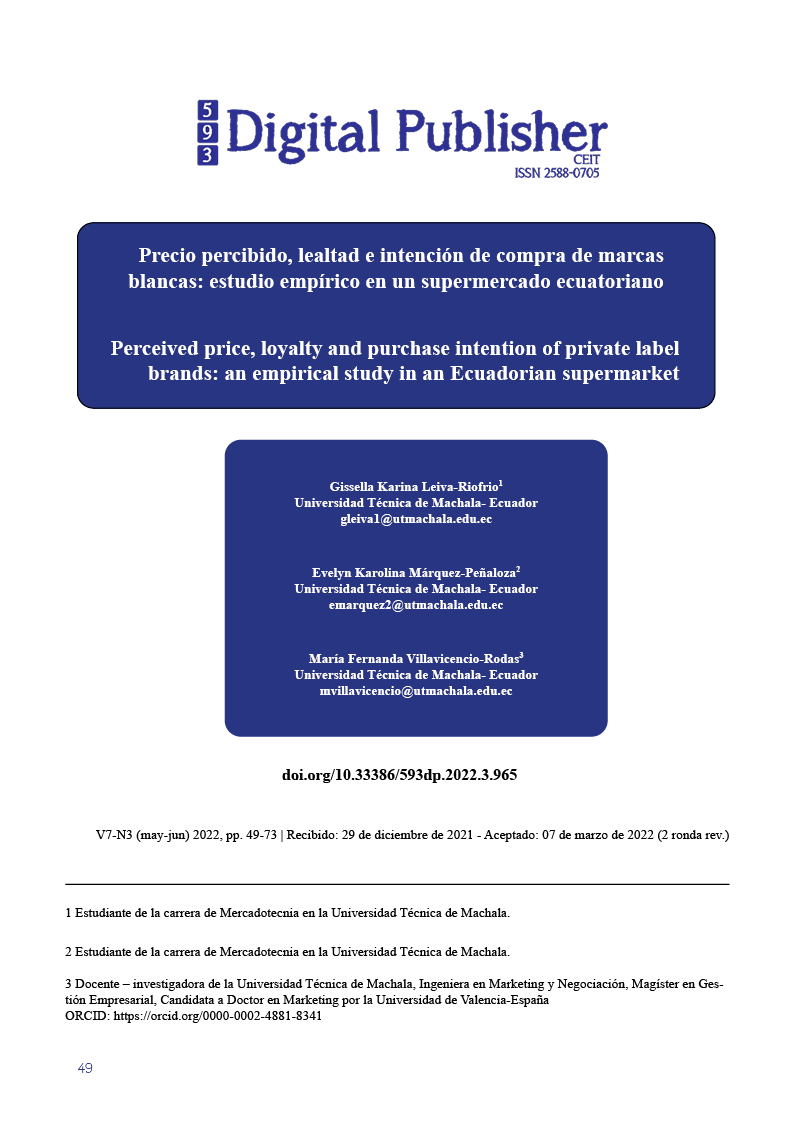Precio percibido, lealtad e intención de compra de marcas blancas: estudio empírico en un supermercado ecuatoriano
Contenido principal del artículo
Resumen
Los productos de marca blanca han adquirido con los años una creciente relevancia en las preferencias de los consumidores y en las políticas de gestión de los minoristas. El presente estudio tiene como objetivo investigar los factores que influyen en la intención de compra de productos de marca blanca, analizando cuatro variables que son la imagen de marca, el precio percibido, la calidad percibida y la lealtad. Los datos se recogieron mediante un cuestionario a una muestra de 384 clientes de la cadena de supermercados “Mi Comisariato” en la ciudad de Machala. Los resultados muestran que la intención de compra de los consumidores relacionada con los productos de marca blanca se ve influida con mayor fuerza por la lealtad hacia la marca y el precio percibido. El estudio proporciona indicaciones útiles sobre el rol de las marcas blancas en las estrategias de marketing de los minoristas para gestionar los surtidos y lograr diferenciación ante las marcas líderes.
Descargas
Detalles del artículo

Esta obra está bajo una licencia internacional Creative Commons Atribución-NoComercial-CompartirIgual 4.0.
1. Derechos de autor
Las obras que se publican en 593 Digital Publisher CEIT están sujetas a los siguientes términos:
1.1. 593 Digital Publisher CEIT, conserva los derechos patrimoniales (copyright) de las obras publicadas, favorece y permite la reutilización de las mismas bajo la licencia Licencia Creative Commons 4.0 de Reconocimiento-NoComercial-CompartirIgual 4.0, por lo cual se pueden copiar, usar, difundir, transmitir y exponer públicamente, siempre que:
1.1.a. Se cite la autoría y fuente original de su publicación (revista, editorial, URL).
1.1.b. No se usen para fines comerciales u onerosos.
1.1.c. Se mencione la existencia y especificaciones de esta licencia de uso.
Citas
Aaker, D. (1991). Managing Brand Equity Capitalizing on the Value of Brand Name, The Free Press, New York.
Aaker, D., & Keller, K. (1990). Consumer Evaluations of Brand Extentions. Journal of Marketing, 54 (1), 27-41. https://doi.org/10.1177/002224299005400102
Aaker, D., (2008). Managing brand equity: Capitalizing on the value of a brandname. New York: Free Press.
Augustine, A., & Adnan, W. (2020). The effects of perceived price, website trust and online reviews on online hotel booking intention in Kuala Lumpur. Global Scientific Journals, 8(6). ISSN 2320-9186
Acero, A., & León, M., (2019). Las marcas blancas vs marcas tradicionales: Estudio comparativo en productos de la canasta básica, 7 - 8.
Ajzen, I. (1991). The theory of planned behavior. Organizational Behavior and Human Decision Processes, 50(2), 179-211. https://doi.org/10.1016/0749-5978(91)90020-T
Anastasiadou, E., Anestis, M., Karantza, I., & Vlachakis, S. (2020). The coronavirus’ effects on consumer behavior and supermarket activities: insights from Greece and Sweden. International Journal of Sociology and Social Policy. 40 (9-10), 893-907. https://doi.org/10.1108/IJSSP-07-2020-0275
Ávalos, C. (2013). La marca: identidad y estrategia. Austral Comunicación, 2(1). 166-171. http://dx.doi.org/10.26422/aucom.2013.0201.can
Baltas, G. (1997). Determinants of store brand choice: a behavioral analysis. Journal of Product & Brand Manage. 6(5), 315–324. https://doi.org/10.1108/10610429710179480
Barclay, D., Higgins, C., & Thompson. (1995). The Partial Least Squares (PLS) Approach to Casual Modeling: Personal Computer Adoption and Use as an Illustration. Technology Studies, 2(2), 258-309. doi:10.1017/CBO9781107415324.004
Bao, Y., Bao, Y., & Sheng, S. (2011), Motivating purchase of private brands: effects of store image, product signatureness and quality variation, Journal of Business Research, 64(2), 220-226. https://doi.org/10.1016/j.jbusres.2010.02.007
Beneke, J., & Zimmerman, N. (2014). Beyond private label panache: the effect of store image and perceived price on brand prestige. Journal of Consumer Marketing, 31(4), 302 - 303. https://doi.org/10.1108/JCM-12-2013-0801
Beneke, J. (2010). Consumer perceptions of private label brands within the retail grocery sector of South Africa. African Journal of Business Management, 4(2), 203–220
Bernarto, I., Berlianto, M., Palupi, Y., Meilani, M., Masman, R., & Suryawan, I. (2020). The influence of brand awareness, brand image, and brand trust on brand loyalty. Jurnal Manajemen, 14(03), 412-426. http://dx.doi.org/10.24912/jm.v24i3.676
Bilal, M. & Tahir, A. (2013). Factors influencing consumers purchase intentions towards private brands. Journal of Independent Studies and Research-Management, Social Sciences and Economics, 11(2), 17-28. 10.31384/jisrmsse/2013.11.2.2
Brown, G. (1952). Brand loyalty – Fact or fiction? Advertising Age 23, 53–55. https://heinonline.org/HOL/LandingPage?handle=hein.journals/thetmr43&div=45&id=&page=
Boon, L., Fern, Y., & Meng, Y. (2018). A Study of Purchasing Intention of Private Label Brands in Malaysia. Global Business and Management Research, supl. Special Issue, 10(3), 1025
Calvo, C., & Lang, M. (2015). Private labels: The role of manufacturer identification, brand loyalty and image on purchase intention. British Food Journal, 107(2), 506-522. https://doi.org/10.1108/BFJ-06-2014-0216
Coba, G., (9 de julio de 2021). 13 de las mayores 50 empresas crecieron en 2020, según ránking. Obtenido de Primicias: https://www.primicias.ec/noticias/economia/corporacion-favorita-rosado-empresas-ingresos/
Cuneo, A., Milberg, S. J., Benavente, J. M., & Palacios-Fenech, J. (2015). The growth of private label brands: a worldwide phenomenon? Journal of International Marketing, 23(1), 72-90. https://doi.org/10.1509/jim.14.0036
Cuneo, A., Milberg, S. J., del Carmen Alarcon-del-Amo, M., & Lopez-Belbeze, P. (2019). Private label and manufacturer brand choice in a new competitive reality: Strategic directions and the future of brands. European Management Journal, 37(1), 117-128. https://doi.org/10.1016/j.emj.2018.05.003
Cuneo, A., Milberg, S., Alarcon, M., & López, P. (2019). Private label and manufacturer brand choice in a new competitive reality: strategic directions and the future of brands. European Management Journal, 37(1), 117-128. https://doi.org/10.1016/j.emj.2018.05.003
Czeczotko, M., Górska, H., Laskowski, W., & Rostecka, B. (2021). Towards Sustainable Private Labels in an Autonomous Community during COVID-19 - Analysis of Consumer Behavior and Perception on the Example of Tenerife. Sustainability, 13(13), 7467; https://doi.org/10.3390/su13137467
Chang, W. (2021). “Experiential marketing, brand image and brand loyalty: a case study of Starbucks”. British Food Journal, 123(1), 209-223. https://doi.org/10.1108/BFJ-01-2020-0014
Chao, S. (2015). A Study on Consumers’ Attitude towards Brand Image, Athletes Endorsement, and Purchase Intention, International Journal of Organizational Innovation, 8(2), 223-253. ISSN: 1943-1813
Chih-Chung, C., & Su-Chao, C. (2005). Discussion on the behavior intention model of consumer online shopping. Journal of Business and Management, 11(1), 41-57. Obtenido de: https://www.proquest.com/scholarly-journals/discussion-on-behavior-intention-model-consumer/docview/211509201/se-2?accountid=14777
Cho, E., Fiore, A., & Russell, D. (2015). Validation of a fashion brand image scale capturing cognitive, sensory, and affective associations: Testing its role in an extended brand equity model. Psychology & Marketing, 32(1), 28–48. https://doi.org/10.1002/mar.20762
Deonir, T. & Mazzon, J. (2014). Teste de um modelo teórico sobre o valor percebido do preço de um produto. Revista de Administração (São Paulo), 49(3). https://doi.org/10.5700/rausp1167
Deheshti, M., Firouzjah, J., & Alimohammadi, H. (2016). The relationship between brand image and brand trust in sporting goods consumers. Annals of Applied Sport Science, 4(3), 27-34. 10.18869/acadpub.aassjournal.4.3.27
Dimitrieska, S., Koneska, L., Kozareva, K.G., & Teofilovska, J. (2017). The power of private brands. CBU International Conference Proceedings, 5, 114–119. https://doi.org/10.12955/cbup.v5.911
Dodds, W.B., Monroe, K.B. & Grewal, D. (1991). Effects of price, brand and store information on buyers’ product evaluation. Journal of Marketing Research, 28(3), 307-319. https://doi.org/10.2307/3172866
Echeverría, O., Abrego, D., & Medina, J. (2018). La responsabilidad social empresarial en la imagen de marca afectiva y reputación. Revista Publicado, Innovar Journal, 28(69). 133-147 https://doi.org/10.15446/innovar.v28n69.71703.
Echeverría, O., Abrego, D., & Medina, J. (2021). La autenticidad de la marca, su efecto en la imagen y reputación de marca de productos cerveceros en México. Estudios gerenciales-Journal of Management and economics for Iberoamerica, 37(160), 364-374. https://doi.org/10.18046/j.estger.2021.160.3966
Elseidi, R., & El-Baz, D. (2016). Electronic word of mouth effects on consumers’ brand attitudes, brand image and purchase intention: an empirical study in Egypt. The Business & Management Review, 7(5), 514-522
El Universo. (07 de diciembre de 2020). Economía ecuatoriana se contraerá en 9% al cierre de 2020 debido al COVID-19, estima el ministerio Mauricio Pozo. Obtenido de Universo: https://www.eluniverso.com/noticias/2020/12/07/nota/8074870/economia-ecuatoriana-se-contraera-9-cierre-2020-debido-covid-19/
Egele, A., Ikechi, P., & Udu, A. (2017) The influence of consumer attitude on private label brand purchase behavior in Port Harcourt, Rivers State, Nigeria. IOSR Journal of Humanities and Social Science, 22(8), 58–7. e-ISSN: 2279-0837, p-ISSN: 2279-0845.
Fornari, D., Fornari, E., Grandi, S., & Menegatti, M. (2016). Leading national brands facing store brands competition: is price competitiveness the only thing that matters? Journal of Retailing and Consumer Services. 30, 234–241. https://doi.org/10.1016/j.jretconser.2016.02.001
Fornell, C., & Larcker, D. (1981). Evaluating structural equation models with unobservable variables and measurement error. Journal of Marketing Research, 18(1), 39-50.
García, M. (2020). Covid - 19 y su influencia en el comportamiento del consumidor. Ciencia, Cultura y Sociedad, 5(2), 6-8. https://doi.org/10.5377/ccs.v5i2.10197
Gangwani, S., Mathur, M., & Shahad, S. (2020). Influence of consumer perceptions of private label brands on store loyalty – evidence from Indian retailing. Cogent Business & Management, 7(1), 1-8 https://doi.org/10.1080/23311975.2020.1751905
Gangwani, S., Mathur, M., Chaudhary, A., & Benbelgacem, S. (2020). Investigating Key Factors influencing purchase intention of apparel private label brands in India. Academy of Strategic Management Journal, 19(3), 1-8. ISSN: 1939-6104-19-3-549
Gielens, K., Ma, Y., Namin, A., Sethuraman, R., Smith, R., Bachtel, R., & Jervis, S. (2021). The future of private labels: towards a smart private label strategy. Journal of Retailing. 97(1), 99-115. https://doi.org/10.1016/j.jretai.2020.10.007
González, Mieres, C., Díaz Martín, A., & Trespalacios, J. (2006). Riesgo percibido en marcas del distribuidor. Un modelo integrador. Cuadernos de economía y dirección de empresa, 27(1), 127-137. ISSN 1138-5758.
Ghosh, A. (1990). Retail management. Chicago: Drydden press, 2(1), 746. ISSN 0030215129
Habel, J., Schons, L., Alavi, S. & Wieseke, J. (2015). Warm glow or extra charge? The ambivalent effect of corporate social responsibility activities on customers’ perceived price fairness. Journal of Marketing, 80(1), 84-105. https://doi.org/10.1509/jm.14.089
Haro, A. (2017). Identifying Factors of Purchase Intention for Private Label Brands. Business Management and Economics Research, 3(10), 188-191. ISSN: 2412-1770
Hair, J., Hult, G., Ringle, C., & Sarstedt, M. (2016). A primer on partial least squares structural quiation modeling (PLS-SEM). Los Ángeles: Sage Publications, 38(2), 220-221. https://doi.org/10.1080/1743727X.2015.1005806
Henseler, J., Ringle, C.M., & Sarstedt, M. (2015). A new criterion for assessing discriminant validity in variance-based structural equation modeling. Journal of Academy of Marketing Science, 43(1), 115-135. https://doi.org/10.1007/s11747-014-0403-8
Hidalgo, M., Martos, M., & González, O. (2017). Attitudes vs. Purchase Behaviors as Experienced Dissonance: The Roles of Knowledge and Consumer Orientations in Organic Market. Frontiers in Psychology, 8(258), 5. https://doi.org/10.3389/fpsyg.2017.00248
Huang, Y., y Huddleston, P., (2009), Retailer premium own-brands: creating customer loyalty through own-brand products advantage. International Journal of Retail and Distribution Management, 37(11), 975-992. https://doi.org/10.1108/09590550910999389
Huang, Chun-Ceng., Szu-Wei Y. dan Cheng-Yi L., (2014). The Relationship among Corporate Social Responsibility, Service Quality, Corporate Image and Purchase Intention. International Journal of Organizational Innovation, 6(3), 68- 84.
Huang, L., Wang, M., Chen, Z., Deng, B., & Huang, W., (2020). Brand image and customer loyalty: Transmitting roles of cognitive and affective brand trust. Social Behavior and Personality: an international journal, 48(5), 1-12. https://doi.org/10.2224/sbp.9069
Instituto de Estadísticas y Censos., (2021). Encuesta nacional de empleo, desempleo y subempleo. Obtenido de INEC: https://www.ecuadorencifras.gob.ec/empleo-sep-2021/
Jaafar, S., Lalp, P., & Mohamed, M., (2012). Consumers’ Perceptions, Attitudes and Purchase Intention towards Private Label Food Products in Malaysia. Asian Journal of Business and Management Sciences, 2(8), 73-90, ISSN: 2047-2528
Jamal, J; Tareq, M & Nawras, N., (2020). The Influence of Private Labels on Customer Loyalty, the Mediating Role of Customer Satisfaction, WSEAS Transactions on Business and Economics, 17(496), 496-504. https://doi.org/10.1080/23311975.2020.1751905
Kakkos, N; Trivellas, P & Sdrolia, L. (2016). Identifying Drivers of Purchase Intention for Private Label Brands. Preliminary Evidence from Greek Consumers. Procedia - Social and Behavioral Sciences, 175(12), 522-528. https://doi.org/10.1016/j.sbspro.2015.01.1232
Kara, A., Rojas, J., Kucukemiroglu, O., & Harcar, T. (2009). Consumer preferences of store brands: Role of prior experiences and value consciousness. Journal of Targeting, Measurement and Analysis for Marketing, 17(2), 127-137. https://doi.org/10.1057/jt.2009.6
Karoui, S., Belaid, S., & Lacoeuilhe, J. (2021). When Measuring the Actual Purchase of Private Labels: Attitude Dethrones the Price Sensitivity, Springer Proceedings in Business and Economics, in: Francisco J. Martínez-López & Juan Carlos Gázquez-Abad (ed.), Advances in National Brand and Private Label Marketing, 77-88. http://doi.org/10.1007/978-3-030-76935-2_10
Koschate, N., Cramer, J., & Hoyer, W. (2014). Moderating effects of the relationship between private label share and store loyalty. Journal of Marketing. 78(2), 69–82. https://doi.org/10.1509/jm.13.0075
Kavita, S. & Shivani, G. (2016). An Investigation into Consumer Search and Evaluation Behaviour: Effect of Brand Name and Price Perceptions. Revista: SAGE, 20(1). 24–36. https://doi.org/10.1177/0972262916628946
Keller, K. (1993). Conceptualizing, measuring, and managing customer-based brand equity. Journal of Marketing, 57(1), 1-22. https://doi.org/10.2307/1252054
Keller, K. (2001). Building customer-based brand equity: A blueprint for creating strong brands building customer-based brand equity. Journal of Marketing Communications, 15(2-3), 55-139. https://doi.org/10.1080/13527260902757530
Keller, K. (Ed. 4). (2012). Strategic Brand Management: Building, Measuring and Managing Brand Equity. Prentice-Hall. ISBN-13: 978-0132664257
Keller, K., Geyskens, I., & Dekimpe, M. (2020). Opening the Umbrella: The Effect of Rebranding Multiple Category Specific PrivateLabel Brands to One Umbrella Brand. Journal of Marketing Research, 57 (4), 677–94. https://doi.org/10.1177/0022243720922853
Koschate, N., Cramer, J., & Hoyer, W., (2014). Moderating effects of the relationship between private label share and store loyalty. Journal Marketing. 78(2), 69–82. https://doi.org/10.1509/jm.13.0075
Kotler, P., & Pfoertsch, W. (2008). Ingredient branding: Making the invisible visible. Springer Science & Business Media.
Kotler, P., & Armstrong, G. (2010), Global and South African Perspectives: Principles of Marketing, Pearson Education.
Kotler, P., & Keller, K. (Ed. 15). (2016). Marketing management. New Jersey: Pearson Pretice Hall, Inc.
Kumar, R., & Kaushal, S. (2017). Examining factors affecting consumers’ attitude and purchase intention with special reference to electronic durable goods. NMIMS Management Review, 35(3), 25-45. ISSN: 0971-1023
Larios, E., Fischer, L., Peñalosa, M & Ortega, M. (2021). Comportamiento de compra en COVID-19: un estudio cruzado en México, Colombia y Ecuador. ScienceDirect, 7(3), 2. https://doi.org/10.1016/j.heliyon.2021.e06468
Laato, S., Islam, A. N., Farooq, A., & Dhir, A. (2020). Unusual purchasing behavior during the early stages of the COVID-19 pandemic: The stimulus-organism-response approach. Journal of Retailing and Consumer Services, 57, 102224. https://doi.org/10.1016/j.jretconser.2020.102224
Lee, J., James, J., & Kim, Y., (2014). A Reconceptualization of Brand Image. International Journal of Business Administration. 5(4). 1-11. https://doi.org/10.5430/ijba.v5n4p1
Loureiro, F. García, T & Wegener, D., (2020). Normas para 150 productos de consumo: complejidad percibida, objetividad de calidad, naturaleza material / experiencial, precio percibido, familiaridad y actitud. New Journal Introducing PLO CLIMATE. https://doi.org/10.1371/journal.pone.0238848
Long, C., Sha, Z., & Gan, S., (2010). Development and verification of an FMCG brand image conceptual model based on Chinese consumer samples In Chinese. Forecasting. 29, 19–25. https://doi.org/10.3969/j.issn.1003-5192.2010.03.004
Martos-Partal, González-Benito, & Fustinoni Venturini. (2015). Motivational Profiling of Store Brand Shoppers: Differences Across Quality Tiers. Marketing Letters. Marketing Letters. 26 (2), 187–200. https://doi.org/10.1007/s11002-013-9274-x
Martins, J., Costa, C., Oliveira, T., Gonçalves, R. & Branco, F., (2019). How smartphone advertising influences consumers’ purchase intention. Journal of Business Research, 94, 378–387. https://doi.org/10.1016/j.jbusres.2017.12.047
Marques, C., Vinhas, R., Davcik., N, & Tamagnini, R. (2020). The role of brand equity in a new rebranding strategy of a private label brand. Journal of Business Research, 117, 497-507. https://doi.org/10.1016/j.jbusres.2020.06.022
Mejía, C., Cherres, D., & Ramos, S., (2020). Percepción de marca y comportamiento de compra del consumidor en empresas del sector comercial ungurahua. 593 Digital Publisher CEIT. 5(2). 70-80 https://doi.org/10.33386/593dp.2020.2.168
Milberg, S., Cuneo A., & Langlois, C. (2019). Should leading brand manufacturers supply private label brands to retailers: Calibrating the trade-offs. Industrial Marketing Management, 76, 192-202. https://doi.org/10.1016/j.indmarman.2018.09.001
Munusamy, J., & Wong, C., (2008). Relation Between marketing mix strategy and consumer motive: an Empirical Study in Major Tesco Stores. Unitar E- Journal. 9(1): 45- 49. ISBN: 3-540-28399-4
Müller, J; Amezcua, J & Müller, S., (2021) Intención de compra de productos verdes de acuerdo con la Teoría del Comportamiento Planeado: Incorporación de la obligación moral al modelo, Revista Academia y Negocios, 7(1), 15-30. https://doi.org/10.29393/RAN6-2ICJM30002
Netemeyer, R., Krishnan, B., Pullig, C., Wang, G., Yaggi, M., Dean, D., Ricks, J., & Wirth, F. (2004). Developing and validating measures of facets of customer-based brandy, Journal of Business Research, 57(2), 209-224. https://doi.org/10.1016/S0148-2963(01)00303-4
Nguyen, N., Van, E., Rutsaert, P., Tuan, T., & Verbeke, W. (2018). Consumer valuation of quality rice attributes in a developing economy. Evidence from a choice experiment in Vietnam. British Food Journal. 120(5), 1059–1072. https://doi.org/10.1108/BFJ-05-2017-0277
Pektaş, S., & Semiz, B. (2021). Tüketicilerin özel markalı ürünlere yönelik tutumlarını etkileyen faktörlerin tekrar satın alma niyeti üzerindeki etkisinin incelenmesi: Kişisel bakım ürünlerine yönelik bir araştırma. Turkish Journal of Marketing, 6 (1), 32- 50. https://doi.org/10.30685/tujom.v6i1.112
Pesántez-Nieto, B., & Sánchez-Cumbicos, G., & Villavicencio-Rodas, M., (2021). Comportamiento del consumidor en pandemia, una mirada desde el sector inmobiliario de la provincia de El Oro. 593 Digital Publisher CEIT, 6(6), 293-305. https:// doi.org/10.33386/593dp.2021.6.765
Ramadhan, M., & Muthohar, M., (2019). The influence of perceived price, perceived quality, brand image, and store image on the purchase intention of Hypermart private label. Atlantis Press, Actas del XVI Simposio Internacional de Gestión (INSYMA 2019). 140-143. https://doi.org/10.2991/insyma-19.2019.36
Revista Vistazo., (2021). Top de marcas más recordadas del Ecuador. Obtenido de Revista Vistazo: https://www.vistazo.com/actualidad/nacional/top-de-marcas-mas-recordadas-del-ecuador-NE503069
Riboldazzi, S., Capriello, A & Martin, D. (2021). Private-label consumer studies: A review and future research agenda. International Journal of Consumer Studies, 45(4), 844-866. https://doi.org/10.1111/ijcs.12675
Rubio, N., Villaseñor, N., & Yagüe, M., (2019). The role of private label tiers and private label naming strategies in the relationship between private label brand equity and store loyalty. Journal of Product & Brand Management. 29(1), 124-138. https://doi.org/10.1108/JPBM-09-2018-2017
Saltos, J., León, A., & Ginzález, L., (2017). La identidad de marca desde el criterio del consumidor ecuatoriano. Revista Publicando. 11(2), 463-479. Obtenido de: https://revistapublicando.org/revista/index.php/crv/article/view/585
Salnikova, E., Baglione, S., & Stanton, J. New Product Introduction Success for Private Label Products Compared to Branded by Product Category. Journal of International Food & Agribusiness Marketing, 33(3), 209-304. https://doi.org/10.1080/08974438.2020.1795774
Sallam, M.M.A & Wahid, N. A. 2012. Endorser Credibility Effects on Yemeni Male Consumer’s Attitudes towards Advertising, Brand Attitude and Purchase Intention: The Mediating Role of Attitude toward Brand. International Business Research. 5 (4), 55-66. http://dx.doi.org/10.5539/ibr.v5n4p55
Sansone, M., Musso, F., Colamatteo, A., & Pagnanelli M. (2021). Factors affecting the purchase of private label food products. British Food Journal, 123(3), 1207-1222. https://doi.org/10.1108/BFJ-01-2020-0048
Sansone, M., Bravi, L., Colamatteo, A., Murmura, F., Pagnanelli, M., & Musso, F., (2021). Private Label Products Buying Decisions: A Comparative Analysis on Consumer Perspective. In National Brand and Private Label Marketing Conference Springer. 41-46. http://doi.org/10.1007/978-3-030-76935-2_6
Sethuraman, R., & Gielens, K., (2014). Determinants of store brand share. Journal of Retailing. 90(2), 141-153. https://doi.org/10.1016/j.jretai.2014.04.002
Singh, A. (2020). Emerging third generation private label brands: retailers’ and consumers’ perspectives towards leading Indian retail chains. International Journal of Business and Emerging Markets, 12(2), 179. http://doi.org/10.1504/IJBEM.2020.107727
Schirmera, N., Ringle, C., Gudergan, S., & Feisteld, M., (2016). The link between customer satisfaction and loyalty: the moderating role of customer characteristics. Journal of Strategic Marketing. 298-317. https://doi.org/10.1080/0965254X.2016.1240214
Springer, M., Olbrich, R., Brüggemann, P., & Schultz, C. (2021). Product Variety and Loyalty to National Brands – A Combined Measurement of Purchase Sequence and Coverage of Demand. Advances in National Brand and Private Label Marketing. In National Brand and Private Label Marketing Conference Springer, 1-11. https://doi.org/10.1007/978-3-030-76935-2_1
Thanasuta, K., (2015). Thai consumers’ purchase decisions and private label brands. International of Journal Emerging Markets. 10(1), 102–121. https://doi.org/10.1108/IJOEM-02-2011-0016
Trabelsi, M., (2020). The Consumer-Private Labels Bond and the Store Loyalty: The Role of Satisfaction. Open Journal of Business and Management. 8(2), 428 - 451. 10.4236/ojbm.2020.82027
Tunjungsari, H., Syahrivar, J., y Chairy, C., (2020). Brand loyalty as mediator of brand image-repurchase intention relationship of premium-priced, high-tech product in Indonesia. Jurnal Manajemen Maranatha, 20(1), 21-30. https://doi.org/10.28932/jmm.v20i1.2815
Valaskova, K., Kliestikova, J., & Krizanova, A. (2018). Consumer Perception of Private Label Products: An Empirical Research. Journal of Competitiveness. 10(3), 149–163. https://doi.org/10.7441/joc.2018.03.10
Villarejo, A., & Sanchez, M., (2005). The impact of marketing communication and price promotion on brand equity. Journal of Product and Brand Management. 12(6), 431-444. https://doi.org/10.1057/palgrave.bm.2540238
Vidrio, S., Rebolledo, A., & Galindo, S., (2019). Calidad del servicio hotelero, lealtad e intención de compra. Investigación Administrativa. 49(125). https://doi.org/10.35426/iav49n125.02
Votchik, N; Jae-Wun, Ch., & Jong -Woo L. (2020). Determinants of Private Label’s Purchase Intention in the Korean Market. Journal of Distribution Science. 18(10), 121-130. http://dx.doi.org/10.15722/jds.18.10.202010.121
Walsh, G., Mitchell, V., (2010). Consumers’ intention to buy private label brands revisited. Journal General Manage. 35(3), 3–24. https://doi.org/10.1177/030630701003500302
Wang, Edwards S., (2015). Effect of food service-brand equity on consumer-perceived food value, physical risk, and brand preference. British Food Journal. 117(2), 553-564. https://doi.org/10.1108/BFJ-09-2013-0260
Wu, P; Yeh, G., & Hsiao, C., (2011). The effect of store image and service quality on brand image and purchase intention for private label brands. Australasian Marketing Journal. 19(4), 30-39. https://doi.org/10.1016/j.ausmj.2010.11.001
Wu, L., Yang, W., & Wu, J. (2021). Private label management: A literature review. Journal of Business Research, 125, 368-384. https://doi.org/10.1016/j.jbusres.2020.12.032
Yan, L., Xiaojun, F., Li, J., & Dong, X., (2019). Extrinsic cues, perceived quality, and purchase intention for private labels. Asia Pacific Journal of Marketing and Logistics. 31(3), 714-727. https://doi.org/10.1108/APJML-08-2017-0176
Yoo, B., Donthu, N., & Lee, S., (2000). An examination of selected marketing mix elements and brand equity. Journal of the Academy of Marketing Science, 28 (2), 195-211. https://doi.org/10.1177/0092070300282002
Yrjölä, M., Hokkanen, H., Määttänen, E. y Saarijärvi, H. (2020). Price or Quality? Comparing Consumers’ Perceptions of Competing Private Labels–An Illustrative Analysis in Food Retailing. Advances in National Brand and Private Label Marketing. Springer. 156-163. https://doi.org/10.1007/978-3-030-47764-6_19
Zarzalejos, J., (2019) Consumidores y Marcas: una nueva era. IDEAS LLYC, 32(11). Obtenido de: https://www.revista-uno.com/wp-content/uploads/2019/05/
Zeithaml, V., (1988). Consumer perceptions of price, quality and value: a means-end model and synthesis of evidence. Journal of Marketing. 52(3), 48-62. https://doi.org/10.2307/1251446
Zeithaml V., (1982). Consumer Response to In-Store Price Information Environments. Journal of Consumer Research. 8(4), 357-369. https://doi.org/10.1086/208876
Zheng, D., Chen, Y., Zhang, Z., & Che, H. (2021). Retail price discount depth and perceived quality uncertainty. Journal of Retailing. https://doi.org/10.1016/j.jretai.2021.12.001
Zumba, L., (19 de octubre de 2015). “Las marcas propias, una tendencia que evoluciona”. Escuela Superior Politécnica del Litoral. https://www.espol.edu.ec/es/las-marcas-propias-una-tendencia-que-evoluciona




